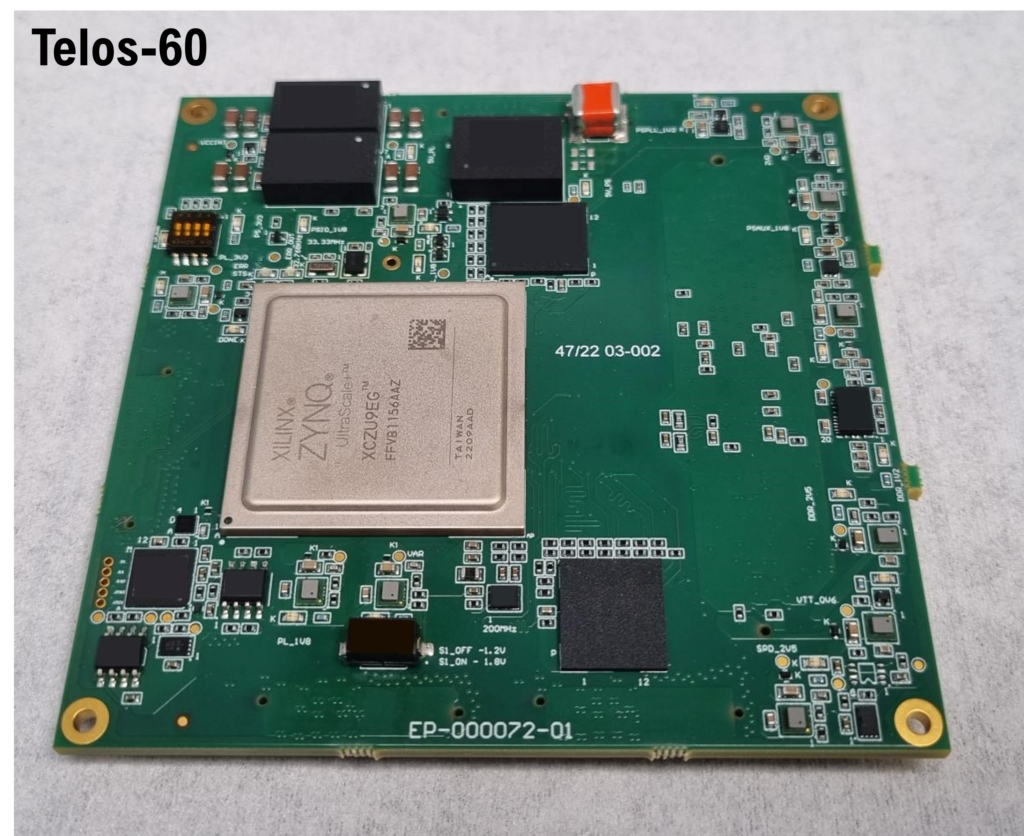
To overcome hurdles associated with our own pursuits, we developed the most powerful compute platform, for both single- and double-precision operations, compatible with nanosatellites. The entry-level Telos OBC is 7x more powerful than the current state-of-the-art. It utilises bleeding-edge FPGA technologies otherwise unavailable to the sector. If you need some serious processing-punch, this is the best you’re going to find.
Telos is a one-step solution for a variety of advanced compute applications such as:
Signal/image processing systems
AI & Machine Learning
Constellation Management

-
- Reliability, fault tolerance and SEU protection are improved though TMR and EDAC on data and logic
- Supplied with OrbAstro flight software or a Linux platform to accelerate applications development (no embedded systems or space electronics expertise required)
- Based on Xilinx Ultrascale+ MPSoCs with ARM cortex A53 and R5 64-bit processing cores, combined with LPDDR4 memory
- Optional extras include the addition of Kintex and Virtex based FPGAs.
- Mechanical and electrical interfaces are customisable with external docks; compatible with PC-104 CubeSat standard
- Supports CV and ANN
- Flight heritage of Telos 10 and Telos 40 series in June-21 and again in Dec-21.
|
Spec |
Telos 10 series |
Telos 40 series |
Telos 60 series |
|
Price (starting from) |
£5,000 |
£8,000 |
£32,000 |
|
A53 |
Dual core @ 1.3GHz |
Quad core @ 1.5GHz |
Quad core @ 1.5GHz |
|
R5 |
Dual core @ 0.5GHz |
Dual core @ 0.6GHz |
Dual core @ 0.6GHz |
|
FPGA |
0.24k – 3.1k DSP blocks, 103k – 730k Logic cells |
0.24k – 3.1k DSP blocks, 103k – 730k Logic cells |
1.9k – 21.3k DSP blocks, 469k – 6451k Logic cells |
|
DRAM |
Up to 4GB (EDAC) |
Up to 16GB (EDAC) |
Up to 64GB (EDAC) |
|
Peak Performance |
1 TFLOPs |
1 – 5 TFLOPs |
3 – 15 TFLOPs |
|
Max DRAM data rate |
>9GB/s |
>9GB/s |
>>200GB/s |
|
Max. Flash |
128GB (EDAC) |
256GB (EDAC) |
1TB (EDAC) |
|
General Interfaces |
4xI2C Master/slave, 4xSPI Master/slave, 4xRS422/RS485, 2x CAN, 1x USB 2.0, Ethernet 10/100/1000Mbps |
4xI2C Master/slave, 4xSPI Master/slave, 4xRS422/RS485, 2x CAN, 1x USB 2.0, Ethernet 10/100/1000Mbps |
4xI2C Master/slave, 4xSPI Master/slave, 4xRS422/RS485, 2x CAN, 1x USB 2.0, Ethernet 10/100/1000Mbps |
|
High Speed Interfaces |
Up to 40x LVDS @ 1.2Gbps, 4x PCIe G2 |
Up to 40x LVDS @ 1.2Gbps, 4x PCIe G2, 1x 10G Ethernet |
40x LVDS @ 1.2Gbps, 4x PCIe G3, 40x Gigabit Transceivers @ 32Gbps, 1x 10G Ethernet |
|
Radiation Tolerance* |
>400krad (TiD), SEU protection on DRAM and Flash |
>400krad (TiD), SEU protection on DRAM and Flash |
>400krad (TiD), SEU protection on DRAM and Flash |
|
Operating Temp. Range |
-20°C to +60°C |
-20°C to +60°C |
-20°C to +60°C |
|
Survival Temp. Range |
-30°C to +100°C |
-30°C to +100°C |
-30°C to +100°C |
|
Operating Voltage |
5 – 60V |
5 – 60V |
5 – 60V |
|
Power Consumption |
0.5 – 8W |
0.5 – 12W |
0.5 – 40W |
|
Mass |
30g (120g with heat sink) |
30g (120g with heat sink) |
90g (195g with heat sink) |
|
Dimensions |
48x48x7mm (without redundancy) |
48x48x7mm (without redundancy) |
95x95x10mm (without redundancy) |
|
Redundancy |
Dual Redundant (optional) |
Dual Redundant (optional) |
Dual Redundant (optional) |
*Radiation testing conducted with a 60MeV proton source
|
Spec |
OrbAstro Telos 10 series |
Zynq 7030 Architecture |
ARM Cortex M7 Architecture |
|
Speed |
750x |
125x |
1x (baseline) |
|
Benchmark Algorithm Time (μs)* |
0.176 |
1.053 |
131.425 |
|
Max Power Consumption |
8W |
5W |
1.5W |
|
Low Power Mode** |
0.26W |
1.1W |
1.5W |
|
RAM |
LPDDR4 (4GB baseline, up to 32GB on request) |
DDR3 (1GB) |
DRAM (2MB) |
|
Size |
48x45x7mm |
65x40x7mm |
95x95x12mm |
|
Mass |
30g |
77g |
60g |
*Measured compute time for each system to process a complex orbital dynamics algorithm
**Performance per specific energy
Get in touch: hello@orbastro.com





